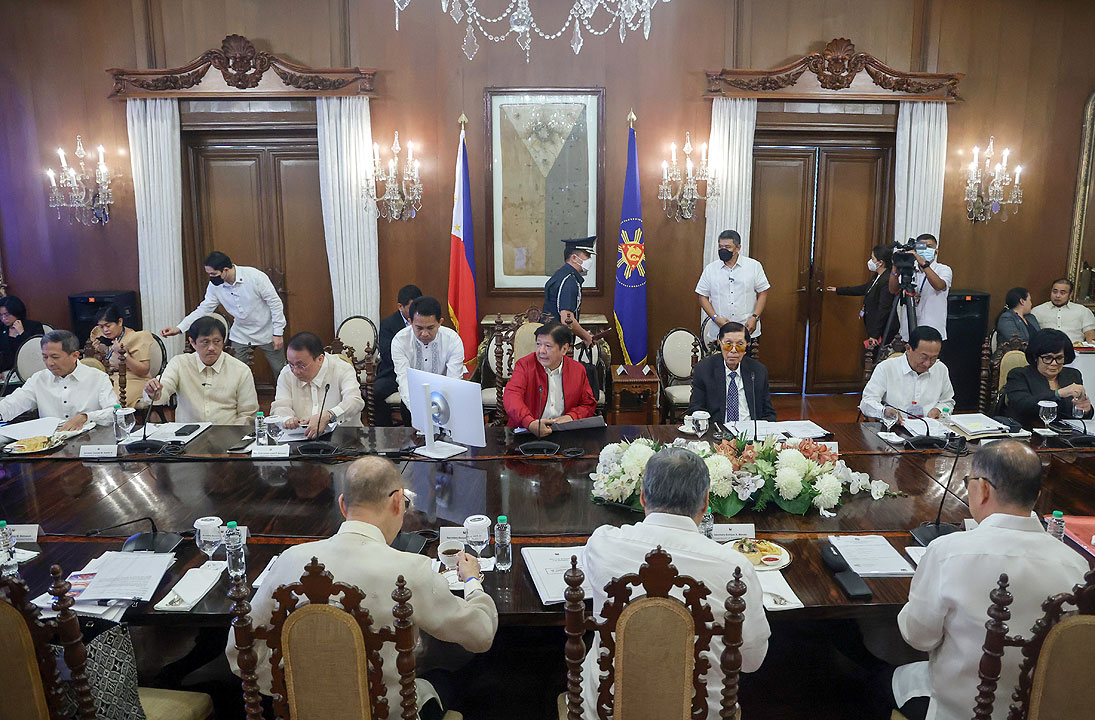
Being Right
By Jemy Gatdula

“We’ve gotta shake the old snow globe once in a while, don’t we? But the important thing is, you’ve gotta learn from the experience.” So says the grizzled gamekeeper Geoff Seacomb, in Netflix’s excellent new show The Gentlemen. “Excellent,” however, isn’t the word that comes to mind for those malevolently sabotaging the Marcos Administration’s policy towards China in defense of our territory.
Read history and use commonsense. The possibility of war is minimized if both countries declare and are convinced that both are quite willing to fight it out, thus making the cost of war higher than the cost of peace.
It’s when a country (or its leaders) exhibit weakness, is deferential to another country, declares unwillingness to fight, or declares the inability to fight that things get problematic. That country is inviting invasion by a foreign country.
If we ever go to war, it is not because we showed strength and declared (as we are correctly doing now) that we’ll defend our territories and stand for our rights. More likely, it’ll happen because the other country got the idea somehow or from someone that we’re divided, weak, or insecure, and unwilling to fight for what is ours.
This is an insight borne and proven consistently by history and current events. The latest example is that taken from the opposite side of the world:
“We have been here before. Europe’s previous attempts to appease a revisionist power with expansionist ambitions were similarly well-meaning, but they nevertheless resulted in WWII. Like Putin, Hitler also rejected the international order of the day and sought to create new realities on the ground through an audacious foreign policy linked to support for ethnic comrades left stranded abroad by post-war borders,” wrote Oleksiy Goncharenko in “The lesson of Crimea: Appeasement never works” (Atlantic Council, February 2020).
“When the Anschluss with Austria went ahead unopposed in March 1938, Hitler laid claim to the Sudetenland in neighboring Czechoslovakia. This led to the Munich Agreement, which has come to be recognized as the ultimate symbol of appeasement. Within a matter of months, Czechoslovakia had ceased to exist and a new world war was underway,” he wrote.
Thus, “history has already taught us that appeasement of an aggressor simply does not work. If the lesson of the 1930s was insufficient, we now have the additional example of the past six years to refresh memories.”
The charge, of course, is that President Marcos the Younger is not merely rectifying any alleged appeasement committed before him but is instead causing undue offense, even aggression, towards China. But this is an argument completely and obnoxiously mind-blowingly insane, free of any moorings from fact and reason:
“A deeper look into the matter reveals otherwise. In fact, tensions in the waters near the Philippines had been growing before Marcos came to power. According to Philippine officials and security experts, ships belonging to China’s coast guard and maritime militias frequently entered disputed waters during Duterte’s time in office, trying to expand their effective control by intimidating and provoking Philippine boats,” wrote Hiroyuki Akita, a Nikkei commentator.
“But Duterte concealed most of these incidents, revealing only a few. His administration was clearly loath to ruffle Beijing’s feathers or admit the failure of its conciliatory policy toward China,” he continued, in a commentary in Nikkei Asia in March called “Why appeasing China will never work.”
‘“The Marcos administration has turned to a policy of publicizing aggressive and dangerous actions by China in order to make the world aware of the existing threat,”’ said Philippine Coast Guard spokesperson Commodore Jay Tristan Tarriela.
‘“But China’s aggressive behavior did not begin during the Marcos era. While there are three serious dangerous actions by China that were publicized during the Duterte administration, there are many other incidents then as well,”’ wrote Mr. Akita, quoting Commodore Tarriela.
“After taking office, Marcos must have realized that the strategy of appeasing China had not worked and never would.” (https://asia.nikkei.com/Spotlight/Comment/Why-appeasing-China-will-never-work)
Which leads us then to the ungentlemanly “gentlemen’s agreement” supposedly entered into between the previous administration and China. The problem is that (even if true) such could not be effected for its obvious unconstitutionality: treaties need to be in writing to have any utility as far as the International Court of Justice is concerned and — more importantly — need to be concurred in by the Senate to be a binding and effective international agreement.
Not to mention that any such agreement is potentially violative of Article I (on Philippine territory), Art XII.2.2 (on the need to protect the nation’s marine wealth in its archipelagic waters, territorial sea, and exclusive economic zone, and reserve its use and enjoyment exclusively to Filipino citizens) and — quite clearly — Article VII.5 (the presidential oath) of the Constitution.
Marcos the Younger, thankfully, was quite clear in rebuffing the idea of any such “agreement”: “I’m not aware of any agreement that the Philippines should remove from its own territory its own ship, the BRP Sierra Madre, from the Ayungin Shoal. And let me go further, if there does exist such an agreement, I rescind that agreement as of now.”
In similar vein, he promised “deliberate” countermeasures against what he termed “illegal, coercive, aggressive, and dangerous attacks” by China. What those countermeasures are, are for now being left unsaid but surely there are many options available to the President under international law, and economic and diplomatic policy.
And even then, countermeasures could be as simple as:
• Implementing our laws;
• Clamping down on smuggling, including “technical smuggling”;
• Stricter application of our immigration rules and enforcing deportations;
• Strictly implementing criminal laws on Chinese workers, fishermen, etc.
• Strictly implementing copyright and patent laws;
• Stricter application of taxation laws on China’s investments and businesses; and,
• Conducting foreign and trade relations with the view to financial gain but also to advancing human rights, labor standards, environmental protection, and democratic values.
• Finally, we cannot allow the malicious manipulation of our own laws to be used to limit our ability to defend ourselves. The Supreme Court has long been consistently clear that certain speech can and should be regulated. There have been various standards laid down by the Supreme Court to determine if certain speech should be silenced, and we thus need to recognize confidently that, whether it be Philippine or international law, the right to free speech is not absolute and that there are inherent limitations to it. We must therefore consider criminally sanctioning or legislate to criminally sanction those:
• Giving support to a foreign country we are in conflict with, with committing treason;
• Contradicting our government due to local political differences that effectively provide support to a foreign country we are in conflict, with committing treason;
• Receiving compensation or benefits from a foreign country we are in conflict with for the purpose of giving support to that foreign country against our country, with committing treason;
• Receiving compensation or benefits from a foreign country for the purpose of giving information to that foreign country to the damage of our country’s national security, with committing espionage.
• Asking citizens to not support our government or to do acts that undermine our government’s proper national security measures or policy, with committing sedition.
Speaking of espionage, Commonwealth Act No. 616 punishes with up to 10- or 20-years imprisonment those inappropriately divulging, during “peacetime,” confidential or non-confidential government information or document (memos, minutes, etc.) to the injury of our national defense and to the advantage of any foreign nation, or does “disloyal acts or works” with intent to interfere with, impair, or influence the loyalty, morale, or discipline of any member of the Philippine military.
An enduring benefit of an Oxbridge education is recognizing that being “a gentleman is to know precisely when to stop being one.” A lesson surely learned by our Oxonian president. We’d be opening ourselves to a larger problem if we allow a misguided minority to demand surrender to a foreign bully. And we must force ourselves to grasp that a defeatist attitude toward China will never work, shows ignorance of history, and is practically treasonous at this juncture.
Jemy Gatdula read international law at the University of Cambridge. He is the dean of the Institute of Law of the University of Asia and the Pacific, and is a Philippine Judicial Academy lecturer for constitutional philosophy and jurisprudence.
https://www.facebook.com/jigatdula/
Twitter @jemygatdula